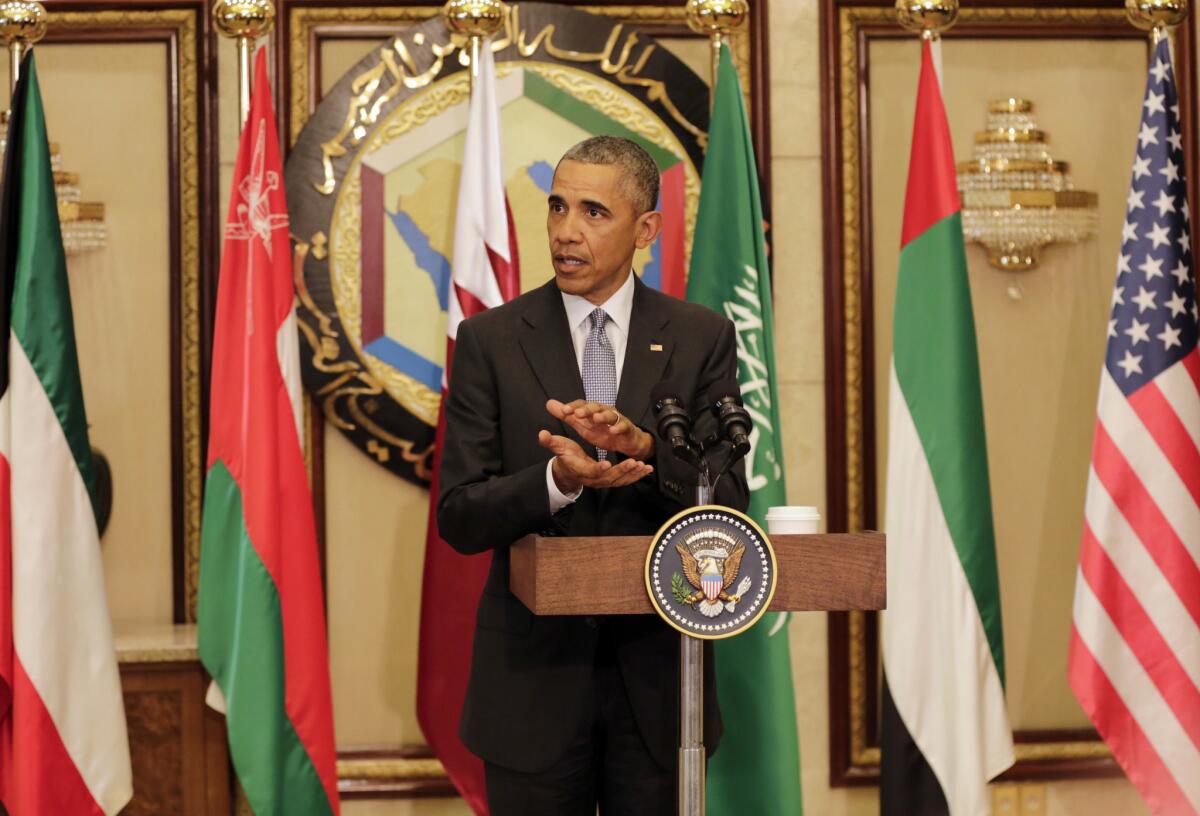Senate approves 9/11 legislation despite Saudi threats

President Obama speaks at a news conference during a trip to Riyadh, Saudi Arabia, last month after meeting with Saudi King Salman and other Arab heads of state.
- Share via
Reporting from Washington — The Senate passed legislation Tuesday that would allow families of 9/11 victims to sue the government of Saudi Arabia despite a White House veto threat and fierce objections from the U.S. ally.
The Justice Against Sponsors of Terrorism Act, approved by voice vote, had triggered a threat from Riyadh to pull billions of dollars from the U.S. economy if the bill is enacted.
The legislation, sponsored by Sens. John Cornyn (R-Texas) and Charles E. Schumer (D-N.Y.), gives victims’ families the right to sue in U.S. court for any role that elements of the Saudi government may have played in the Sept. 11, 2001, attacks that killed thousands in New York, the Washington area and Pennsylvania.
Relatives of 9/11victims have urged the Obama administration to declassify and release U.S. intelligence that allegedly discusses possible Saudi involvement in the attacks.
Passage of the bill sends the message that the United States “will combat terrorism with every tool we have available and that the victims of terrorist attacks in our country should have every means at their disposal to seek justice,” Cornyn said.
Schumer said that any foreign government that aids terrorists who strike the U.S. “will pay a price if it is proven they have done so.”
Senate Democrats had firmly supported the legislation, putting them at odds with the Obama administration. The White House has said the bill could expose Americans overseas to legal risks.
Schumer was confident the Senate had the 67 votes to override a presidential veto.
“We don’t think their arguments stand up,” the New York lawmaker told reporters at a news conference after the Senate action.
Sen. Lindsey Graham (R-S.C.), the chairman of the Senate subcommittee that controls foreign aid, had blocked the bill from moving to the Senate floor until changes were made to ensure the legislation didn’t backfire on the United States.
Graham’s apprehension was rooted in the possibility a foreign country could sue the United States if the door is opened for U.S. citizens to take the Saudis to court. Graham released his hold earlier this month, clearing the way for Senate action.
Sen. John McCain (R-Ariz.), chairman of the Armed Services Committee, also had warned that the legislation, if passed, would alienate Saudi Arabia and undermine a longstanding yet strained relationship with a critical U.S. ally in the Middle East.
ALSO
Some debt collectors in Russia will call borrowers at all hours, and then it can get violent
Even in fast-changing India, kushti wrestling is a wellspring of power, pride and identity
A ‘global terrorist’ comes in from the cold: Afghan warlord was ally of CIA, then Osama bin Laden
More to Read
Sign up for Essential California
The most important California stories and recommendations in your inbox every morning.
You may occasionally receive promotional content from the Los Angeles Times.










